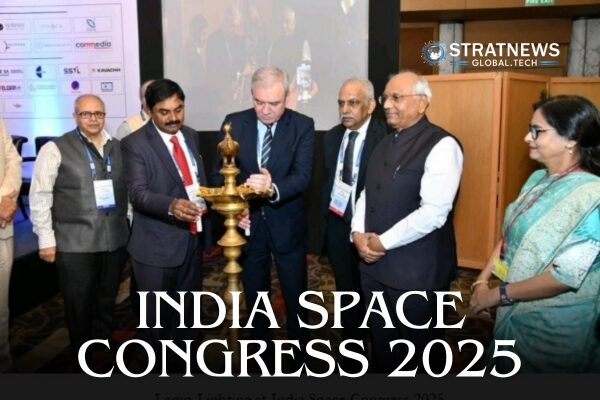India’s space ambitions took a decisive step forward as the India Space Congress 2025 concluded with clear outcomes: a national push for space sustainability, enhanced cybersecurity cooperation, AI-enabled innovation, and stronger international and cross-sectoral partnerships.
In a major breakthrough, SIA-India and the Nabhah Cosmos Foundation signed the Nabhah–SIA India Declaration on Space Sustainability—India’s first national framework addressing space debris.
The declaration includes a six-point National Action Plan aimed at protecting orbital infrastructure through collective responsibility, regulatory alignment, and AI-driven monitoring. It also called for a “National Convergence” that brings together government, industry, academia, and civil society to safeguard India’s space assets against the growing threat of uncontrolled orbital traffic.
Strategic MoUs were also signed with CERT-In, AI4ICPS at IIT Kharagpur, and INFOTER (Hungary) to enhance cooperation in cybersecurity, artificial intelligence, and global data exchange—key components of India’s evolving space infrastructure.
“India is not just navigating space—it is shaping how that journey is governed, kept secure, and opened up for investment and innovation,” said organisers SIA-India in a statement summarising the event’s achievements.
Investing in Innovation, Empowering Entrepreneurs
Highlighting the government’s strong backing of innovation, Ms. Arti Bhatnagar, Special Secretary & Financial Advisor, DPIIT, announced, “We’ve committed Rs 945 crore through the Startup Seed Fund to support incubators across IITs, IISc, and beyond—empowering entrepreneurs even in aspirational districts.”
She celebrated India’s rise as the third-largest startup ecosystem in the world, crediting space tech startups for their role in this growth: “From Skyroot Aerospace launching India’s first private rocket to breakthroughs in reusable technology, we’re witnessing history. Initiatives like PM Gati Shakti and Fasal Bima Yojana show how space tech is powering inclusive development and real-world outcomes.”
Space and Security: A Strategic Priority
As space becomes increasingly entangled with national security, military experts at the India Space Congress 2025 emphasized the urgency of integrating space policy with defence frameworks.
Lt. Gen Rakesh Kapoor (Retd), Deputy Chief of Army Staff (IS&C), said, “The entire lexicon and grammar of conflict is evolving, driven significantly by technology. The Indian Space Council needs structural realignment. We must review institutions across diplomacy, industry, and security to keep pace with change.”
He pointed to the growing relevance of space assets in navigation, surveillance, and communications, especially in regions where persistent coverage is lacking.
Echoing this theme, Lt. Gen Vinod G Khandare (Retd), Former Principal Advisor, Ministry of Defence, added, “As we strive toward Viksit Bharat, it’s equally important to ensure Surakshit Bharat. Balancing development with deterrence is essential to maintaining our national momentum.”
Long-Term Vision, Grounded in Partnerships
Reflecting on the Congress’s achievements, Dr. Subba Rao Pavuluri, President of SIA-India, said, “Collaboration is one of the fundamental pillars for building global enterprises for a Viksit Bharat by 2047. Information exchange and critical thinking have translated our shared vision into tangible progress.”
Anil Prakash, Director General of SIA-India, stressed the importance of joint investment and innovation, “In the evolving threat matrix, space has become a critical dimension of national defence. Long gestation periods in space innovation demand collective funding and collaboration to pave the way for pioneering advancements.”
From Ambition to Architecture
The Congress made it clear that India’s space strategy is now moving beyond rocket launches and satellite platforms. The focus is shifting toward building a resilient, secure, and inclusive space ecosystem—driven by policy, partnerships, and a planetary sense of responsibility.
With sustainability frameworks, cyber alliances, AI initiatives, and defence integration now in motion, the path to Viksit Bharat by 2047 is being mapped not just in orbits, but through systemic transformation on the ground.


